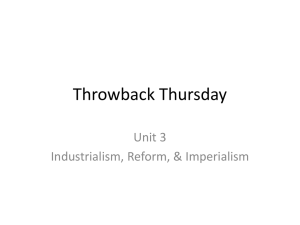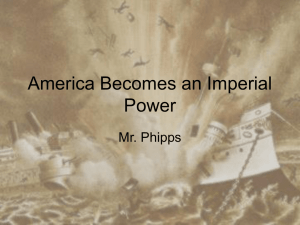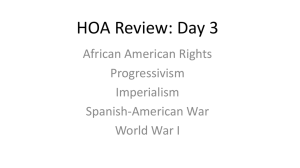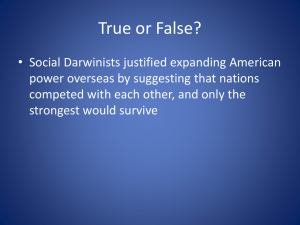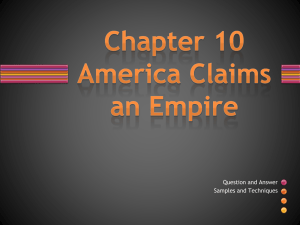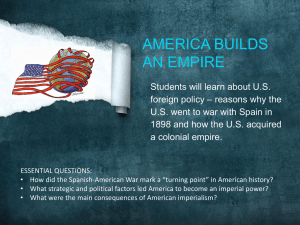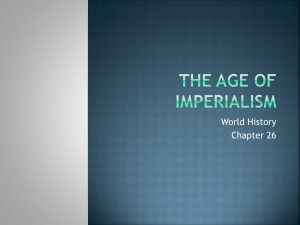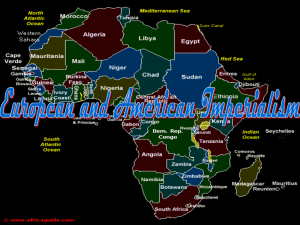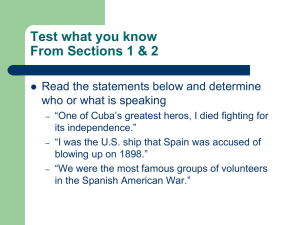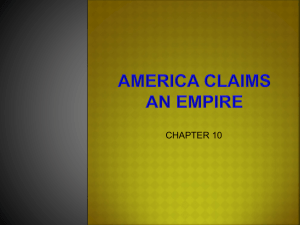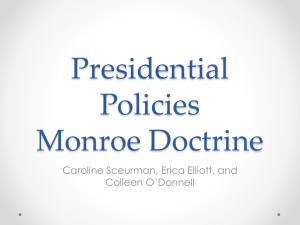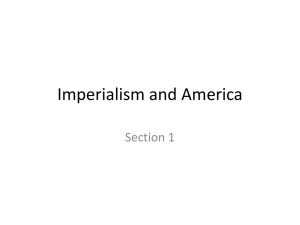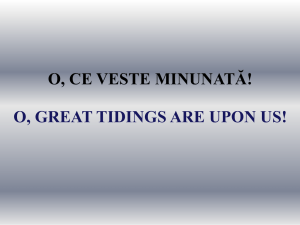Unit 5: America Builds an Empire
advertisement
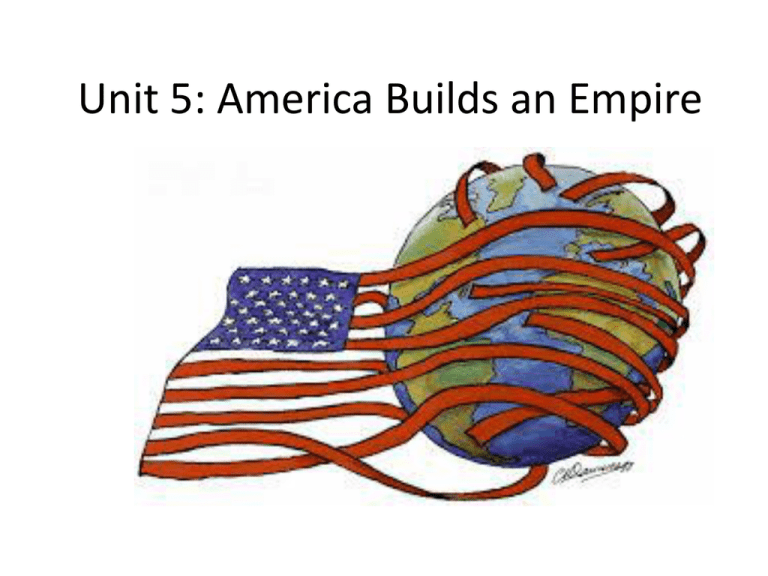
Unit 5: America Builds an Empire What is foreign policy? • A nation’s policies toward other countries Elements of Foreign Relations • International Anarchy: the idea that while citizens in each country are subject to law, the governments of nations are not subject to international laws in all cases • Balance of Power: when one nation becomes too powerful, other nations band together to protect themselves or make sure that the one nation does not over-throw them More Elements of Foreign Relations • Control of US Foreign Policy: the Constitution divides this power between Congress and the President – President negotiates treaties/Senate ratifies – President commands troops/ Congress pays – Congress declares war/President commands troops More Elements of Foreign Relations • Traditional Foreign Policy: America felt protected by the 2 oceans; Washington warned us to stay out of other nations’ problems and remain isolated • National Interests: American interests include: – Security from attack – Protecting American investment – Promoting American democracy The Spanish-American War, 1898 • Origins: (Cuba is a Spanish colony) – In 1894, the US raised it’s tariff (tax) on the sugar imported from Cuba – This lead to a decline in Cuban revenues and increased unemployment and unrest – Cuban refugees, living in the US, are led by Jose Marti to sail back to Cuba and begin a revolution – Marti declared Cuba independent in 1895 – Spain sent troops to put down the rebellion Spanish-American War • Spain’s attempts to end the rebellion were brutal • Entire villages and towns in Cuba were forced into camps surrounded by barbed wire and starved into submission • These events raised humanitarian concerns in the United States Spanish-American War • Joseph Pulitzer’s New York World and William Randolph Heart’s New York Journal were 2 of the major newspapers that covered the story • These papers deliberately sensationalized the news • They depicted the Spanish as murderous brutes in order to sell more papers Spanish-American War • Yellow Journalism: unbalanced, sensationalized reporting intended to sell more papers • This type of news reporting gave Americans an unrealistic view of the events in Cuba • Americans believed that it was important to intervene to protect the Cubans Triggering Events: the De Lome Letter • De Lome is the Spanish Ambassador to the US • A letter he wrote to a friend in Havana was stolen by Cuban rebels and sent to US newspapers • The letter was critical of the US and specifically called President McKinley “weak” • De Lome resigned from office U.S.S. Maine • American naval vessel was sent to Cuba to protect American lives and property during the revolution • While in port in Havana, the ship exploded • The Maine sunk and 258 U.S. sailors died and more were severely injured • Hearst and Pulitzer both blamed the Spanish for the explosion • Heart offered $50,000 reward for capture of the Spaniards responsible • The cause of the explosion is still unknown today Spanish-American War • Public outcry against Spain as a result of the Maine grew • “Remember the Maine” • Spain agreed to US demands for a cease fire with Cuban rebels • April 20, 1898 McKinley asks Congress to declare war on Spain • Congress votes to declare war on April 21, 1898 War in the Pacific • The first battles in the Spanish-American war were fought in the Philippines • Commodore George Dewey sailed the US fleet into Manila harbor and opened fire on the capital city • Dewey destroyed the entire Spanish fleet in Manila • 11,000 US forces and Filipino rebels fought Spain for the next two months • Spanish troops surrendered the Philippines in August Caribbean War • Admiral Sampson blockades Cuba preventing the Spanish fleet from escaping • A small number of professional Army officers were sent into Cuba with 125,000 volunteers • The volunteers were inexperienced, poorly trained, provided with inadequate weapons, and old woolen uniforms from the Civil War Teddy Roosevelt • TR serves as Asst Secretary of the Navy • Believes that for America to become a world power, we must improve our navy • Resigns from War Dept to form an all volunteer cavalry unit to fight in the S-A War • “The Rough Riders” are under the command of General Leonard Wood and TD • Along with regular army troops, they defeat the Spanish at the Battle of San Juan Hill Spanish-American War • July 1st: Rough Riders, 2 regiments of African-American troops, and the 9th and 10th cavalries charged up Kettle Hill and defeat Spanish troops • Infantry and Rough Riders attach San Juan Hill next day, defeat Spain again • 4 days later, Spanish Navy tries to break the blockade • Naval battle along the Cuban coast lasts a week. • Spanish fleet is destroyed • American troops invade Puerto Rico the next week Spanish-American War • Problems: – Yellow Fever (malaria) – Poor training – Old weapons – Unsuitable uniforms – Old officers who were more interested in telling Civil War stories than fighting (General Wheeler) – Delay in getting ships from Atlantic to Pacific and Caribbean….We need a CANAL! Treaty of Paris • The US and Spain sign an armistice resulting in a cease-fire on August 12th • December 10th, US and Spain meet to discuss terms in Paris • Treaty is signed on December 15th • The US Senate will have to ratify Terms of the Treaty of Paris • Spain agrees to give Cuba independence from Spanish rule • Guam and Puerto Rico will be given to the U.S. • Spain will sell the Philippines to the U.S. for $20 million • Thus ends what Secretary of State, John Hay, called “a splendid little war” Is this a turning point in American History? • US no longer isolationist • US gains territories • US naval and military power and influence grow • US enters into international trade • US defeats European power (again) http://www.youtube.com/watch?v=urtm4GpjF u4 Does this event make the US into a world power? • Probably • America viewed as having both economic and military strength • Naval power essential for both and US navy is now the 3rd largest What is Imperialism? • The policy of extending a nation’s authority over other countries by economic, political, or military means Reasons for American Colonial Expansion • Need for Raw Materials: industrial expansion requires coal, oil, rubber, steel, etc… • Need for Markets: increasing production requires new places to sell our stuff • Nationalism: expansion show that the US is a world power to be admired and respected • Strategic Reasons: the need for naval bases around the world to refuel and resupply • Attitudes toward other people: belief that Americans were superior to other people and that we needed to educate/train them to be more like us Alfred Thayer Mahan • Admiral and President of the Naval War College • Wrote The Influence of Sea Power Upon History • Argued that for a nation to become a world power, a powerful navy was required • Colonies and naval bases around the world would be necessary to support merchant ships as well as naval vessels Mahan • Because the US is competing with other nations for supremacy, we should seize control of Pacific trade routes, construct a canal through Central America, and dominate the Caribbean • These things would give us geographic dominance over Atlantic and Pacific trade • T. Roosevelt was one of his followers American Anti-Imperialist League • People like Mark Twain, Andrew Carnegie, Moorefield Storey, and Henry Ford opposed colonialism • They felt that the United States was based on the ideals of democracy and self-government and that to impose our rule on others was hypocrisy • They opposed America acquiring colonies Moorefield Storey • First President of the NAACP • Spokesman for the Anti-Imperialist League • Gave dramatic speech in Boston warning against US colonization Results of Spanish-American War • US wins! • US becomes a world power • US acquires a colonial empire consisting of : – The Philippines – Guam – Hawaii – Puerto Rico – Samoa – Midway The Platt Amendment • A congressional resolution passed in the U.S. Congress prior to the S-A War had guaranteed independence of Cuba • At the end of the war, Cubans were forced to agree to the Platt Amendment to their constitution • This gave the US the right to intervene in Cuban affairs at any time The Philippines • Filipinos were disappointed that the US Congress decided to annex them instead of granting independence • Rebels fought until their defeat in 1902 Hawaii • Hawaiian Islands had proved refueling stations for American ships for many years • American settlers built sugar and pineapple plantations on Hawaii • Missionaries were sent to convert the natives to Christianity Stanford Dole • Queen Liliuokalani attempted to take land and power back from American planters • American lawyer and plantation owner in Hawaii led American landowners to overthrow Hawaii’s Queen in 1887 • President Cleveland refused to annex Hawaii because of Dole’s actions • Dole became President of Hawaii Guam • An important re-fueling stop for US ships • US won as part of the treaty ending the S-A War • Guam is still a territory of the United States Samoa • A Pacific Island group that was divided between the United States and Germany • Provided a valuable naval bases and re-fueling stations for American shipping • American Samoa is still a U.S. territory Midway • Became a US possession in 1867 (before the SA War) • Midway is still an important military base for the U.S. Navy China • In china, European powers had already established “spheres of influence” by 1850 • These would be places where they enjoyed special privileges in trade • The US was not a part of this, but did have an active trade network within China • The US feared that these other nations would work to block US trade with China China • Sec. of State, John Hay, sought to protect US interests and business in China • In 1899, Hay announced America’s “Open Door Policy” in China • This meant that all nations would have equal footing in trade with China China • In 1900, a rebellion erupted in China • Boxers, or Chinese who opposed Western influence in China, rebelled against their government • The Boxer Rebellion threatened the lives of all foreigners in China • An international army, w/ US participation, crushed the rebellion • Hay announced that the US would opposed any annexation of China Japan • The US opened an isolationist Japan to western trade in 1853 • Commodore Matthew Perry landed US naval ships there to end barriers to trade • By the 1890’s, Japan had become the most westernized and industrial nation in Asia • In 1894, Japan invaded and defeated China • In 1905, Japan defeated Russia in the Russo-Japanese War • T. Roosevelt won the Nobel Peace Prize for his help in negotiating peace between Russia & Japan America in the Caribbean • Reasons for US Interest/Involvement: – Security: keep Europe out of Western Hemisphere – Economic Interests: supplies of agricultural and raw materials; markets for US goods, investment – CANAL: S-A War demonstrated that we need a path from the Atlantic to the Pacific to speed up trade and travel (and war ships) Puerto Rico • Became US possession at the end of S-A War • In 1900, Congress established a civil government there • Governor appointed by the President • Upper House of the Legislature chosen by the President • Lower House of the Legislature elected by the people Cuba • Cuba becomes a US “protectorate” due to the Platt Amendment in 1900. • U.S. forces remain in Cuba at Guantanamo Bay today • Platt Amendment was not repealed until 1930 Panama Canal • US Pacific Fleet had to travel 16,000 miles to get to Cuba in the S-A War • This highlighted the need to improve travel between the oceans • The Isthmus of Panama is the narrowest point between the 2 oceans • Seems like the best place for a canal Panama Canal • Panama was a part of Columbia • The US and Columbia entered into negotiations to build a canal • Meanwhile, Panamanian rebels were trying to break away from Columbia • TR struck a deal with the rebels • Roosevelt sent US warship to Panama to protect the rebels Panama Canal • The US immediately recognized an independent Panama • The US was granted a 10 mile strip of land known as the Panama Canal Zone Challenges in Building the Canal • It will take 10 years to complete (1903-1914) • Canal is 51 miles long • Canal crosses 6 different elevations; had to build a series of locks to accommodate for this • Tropical climate! • Dense rainforests • Mountains • Mudslides • Mosquitos! Yellow Fever! Dr. Walter Reed • Major in the US Army Medical Corp assigned to Canal Zone • Discovered that “Yellow Fever” was caused by mosquitos • Yellow fever is one of the “hemorrhagic” diseases • Fever, anorexia, chills, muscle pain, headache, and nausea are symptoms • Liver damage and death may result • 20,000 deaths were attributed to Yellow Fever in building the Panama Canal • Worked to eliminate mosquitos and treat the sick Dr. William Gorgas • Surgeon General of Army Medical Corps • Had all swamps in Canal Zone drained • Sprayed all standing water with oil to prevent mosquitos from breeding • Helped to discover vaccine to prevent disease • Still no cure today once infected Monroe Doctrine (1823) • America’s declaration that Europe could not establish any new colonies in the Western Hemisphere • America used this as justification to intervene in the Caribbean to protect US economic interests Roosevelt Corollary • Also known as the “Big Stick” Policy • Roosevelt said that, “he would walk softly and carry a big stick” • Roosevelt prevented Europe from using force to collect debts from the Dominican Republic • The US would act as “an international police force” • Roosevelt used this to justify intervention in the West indies and Central America Taft/Dollar Diplomacy • Taft encouraged banks to loan $ and invest in Caribbean nations • He used this strategy to promote US foreign policy in the region • When a nation, like Nicaragua, could not repay the debt, he sent US troops to collect the $ • The US took over their railroads, customs duties, and national bank until the debt was paid Wilson and Latin America • Followed pattern of both Roosevelt and Taft in dealing with Haiti, Nicaragua, and Dominican Republic • He sent troops to protect American interests • In 1917, Wilson purchased the American Virgin Islands from Denmark “Watchful Waiting” • When Wilson became President, Mexico was already undergoing a violent revolution • Instead of sending troops or recognizing the new government, Wilson waited to see what would happen Pancho Villa • A leader of the rebellion in Mexico • Brought Mexican rebels across the border to New Mexico and murdered Americans • Wilson sent the American Expeditionary Force under General John J. Pershing to arrest him • Villa eluded capture • The US forces withdrew from Mexico in 1917 when we entered WW I
